Few people have seen as much of the world as candidly as Anthony Bourdain did. He experienced people and cultures in a way many fans could only hope to through his television programs. Now that Bourdain is no longer lighting the path through the lesser-explored world, Bourdain’s producer, director, and friend of nearly 20 years, Tom Vitale, takes another look at the chef and writer’s life and legacy in his new book, In the Weeds: Around the World and Behind the Scenes with Anthony Bourdain.
In the new autobiographical book, Vitale recalls behind-the-scenes moments with Bourdain. Below in his interview with The Manual, Vitale describes the impact Bourdain had on everyone around him.
Inspiration Behind the Book
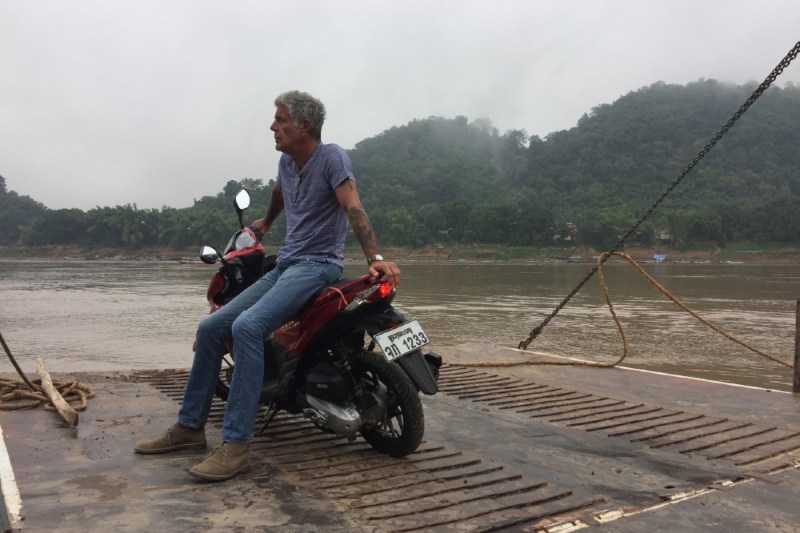
Vitale started working with Tony in 2002 and did so until his passing in 2018. Inspiration-wise, it was pretty easy. It was entire adult life which started on Cook’s Tour, his first show, just out of college.
I started off on the editorial side. I was just logging tapes. I didn’t begin traveling with him until 2006. But from that moment forward, it was pretty much non-stop run. And it was one hell of an adventure. Inspiration-wise, there was no shortage of material and Tony was a pretty fascinating human being. And the places we went and people we met were similarly fantastic.
The Most Challenging Part of Writing In the Weeds
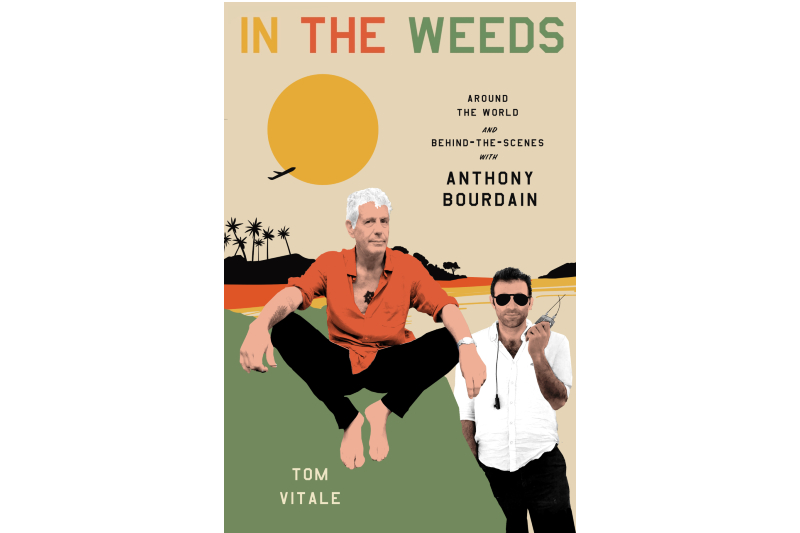
As with many authors, Vitale struggled with finishing the book but his challenge was also one of coming to terms with the passing of Bourdain. He says, “In a lot of ways, writing the book was something I had to do because I didn’t want it to be over. And then, finishing the book I, even though it had been more than three years since his death, had to accept that he was really gone and it was actually over.”
The Process of Writing and Finishing the Book
TM: How is reliving your experience with him different from your day-to-day work on the show and looking back?
Well, writing is obviously very different than making television. It’s a much more solitary process. TV is far more collaborative. And I certainly missed that collaborative nature of TV. However, in a lot of ways it was actually quite similar, in that really did feel like I was reliving all those experiences.
And I found out that I wasn’t actually able to really tap into that or write until I had been awake for at least 24 hours. And then, the words just started to flow. And so, I think I had to spend the nine months of the pandemic awake for a couple of days and sleeping for a couple of days as I would write the book. And I think that helped recreate the intensity and lack of sleep and all those kinds of things that were very much a part of making the shows.
On Working with Anthony Bourdain
TM: When the cameras weren’t rolling, what was he really like?
The Tony that people know publicly was certainly different than the Tony I knew. But it’s not like it was a different person. It was just a very edited version of who he was. A one-hour program was constructed from 60 to 80 hours of raw footage. With that shoot-to-edit ratio, I mean, I think any of us would come off as very different than we are in real life when you have an amazingly talented editor cutting out the repetitive or unflattering moments.
Although, it wasn’t really about cutting out all the unflattering moments because he did actually, part of his magic recipe was making sure to include those and shine a spotlight on his own weaknesses and the uncomfortable parts of things. He was just much bigger. Everything was much bigger in real life.
He was sadder, he was funnier, he was scarier than he would have come across publicly.
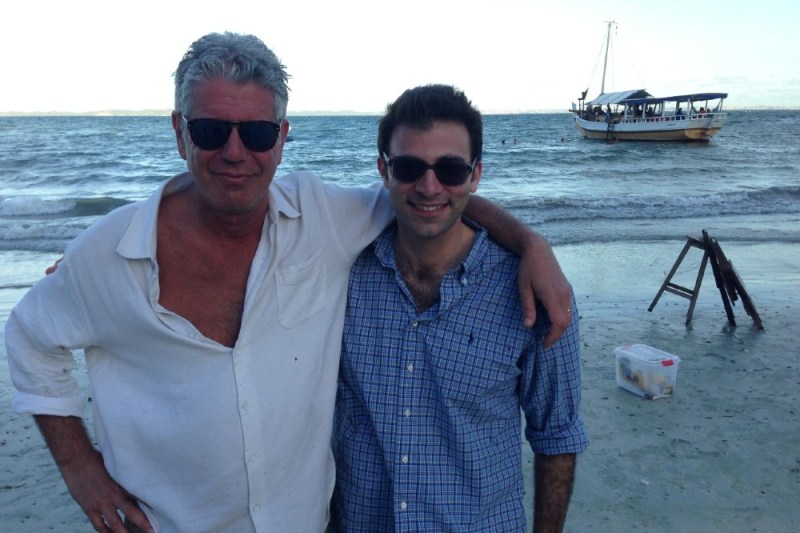
TM: Is there anything that you think people get wrong or don’t understand particularly about him?
I think that you got a pretty good impression and it’s not terribly misunderstood. One thing that would come up is, people would often ask him when we met. People were like, “What’s the weirdest thing you’ve ever eaten?”
And that was very upsetting to him because he never, aside from a few missteps earlier on that were done for shock value perhaps, it was always very important to him that the food that he was eating was not weird food. It was what people, human beings were eating and it was popular there. Even if it might’ve been weird to say an American audience, for instance, it wasn’t weird to the people that he was spending time with. And so, the question, what’s the weirdest thing he ever ate, really cut him because that just so was not what the show was about.
On Anthony Bourdain’s Legacy
TM: What do you believe to be his legacy?
It was always a real fight for Tony, not doing a wrap-up at the end of the show, which he considered to be a betrayal of what was clearly a more complicated topic. This idea that, in an hour of TV, he could have some answer about something that was a war that had been going on for 20 years or sum up a place. And networks do not like breaking of convention for fear of turning off advertisers.
If you look at the body of work, as it evolves from A Cook’s Tour, through No Reservations and Into Parts Unknown, you see the slow accumulation of successes to different battles that had been fought. This ultimately allowed the show to be more what it Tony had always wanted it to be from the beginning.
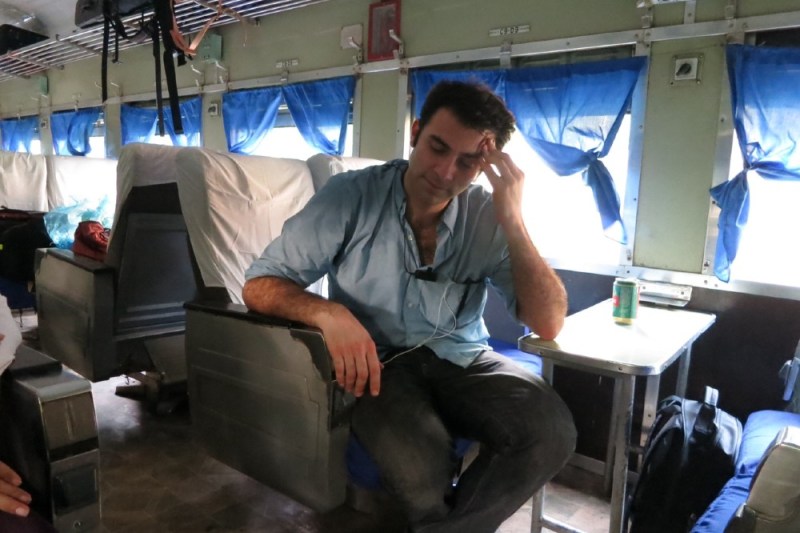
TM: What was the most surprising thing you’ve learned about Tony while working with him?
The only predictable thing about Tony was he was completely unpredictable.
You just never knew how he’d use something, what position he’d have, what creativity he could bring to something. I mean, the only thing was that whatever you imagined it to be, was not going to be what he would do.
And I’ve thought a lot about the pandemic. What would Tony be doing now? The show would have been shut down. He couldn’t have done that. And he was someone who really chose to keep moving a lot and he was a germaphobe. I tend to think it would have been really upsetting to him.
I have theories on what he would have done, but I’m sure whatever it was, he actually would have been doing would’ve been much more amazing and awesome than whatever I can imagine. As far as what would surprise me about him, I mean everything and nothing all at the same time.
Grief Aspect of The Book
TM: Is there anything else you maybe rediscovered or noticed on a more obvious level about him while working on the book?
One of the things that was difficult was seeing, again, firsthand how much he talked about and joked about death and suicide over the years. The, ‘I’m going to hang myself in the shower stall,’ joke would be deployed quite often then about things like, ‘My hotel room is so awful.’ Or, ‘This beer is warm.’ Even his last meal question was one of the occurring icebreakers on camera. Which after several seasons of him constantly asking everybody that question, he’d still keep asking them, but we wouldn’t use that footage.
That part was a little intense. I think that writing the book though, all of a sudden, everything really felt like it changed a lot in the aftermath of his death, specifically because of the fact that he took his own life. I guess the book has been a bit of a process of reclaiming a lot of those stories and memories of everything, including the good times and the adventure and the wonderful aspects about the job. And realizing that that didn’t all have to change just because of the way that Tony’s story ended.
For a couple of years, it was impossible to even think about the funny moments again without thinking about the really awful way it ended. And what if all those great moments, the greatest moments of my life, were ones where he was actually incredibly depressed and unhappy, while I was having the adventure of a lifetime? These are things that you wrestle with.
What I learned from the book is the response to the grief aspect of the book or going through, dealing with the loss and suicide of someone who is incredibly important to you. And that’s certainly an important part of the book. I just want to try to recreate the feeling of what it was like being there, including all the highs and lows and super bizarre, crazy things that happened over the years.
And there’s so much of that in the book. I mean, a lot of it’s really hilarious and funny. I hope that people will take that away from it too. I mean, Tony was always wickedly funny about everything, especially things that were difficult.
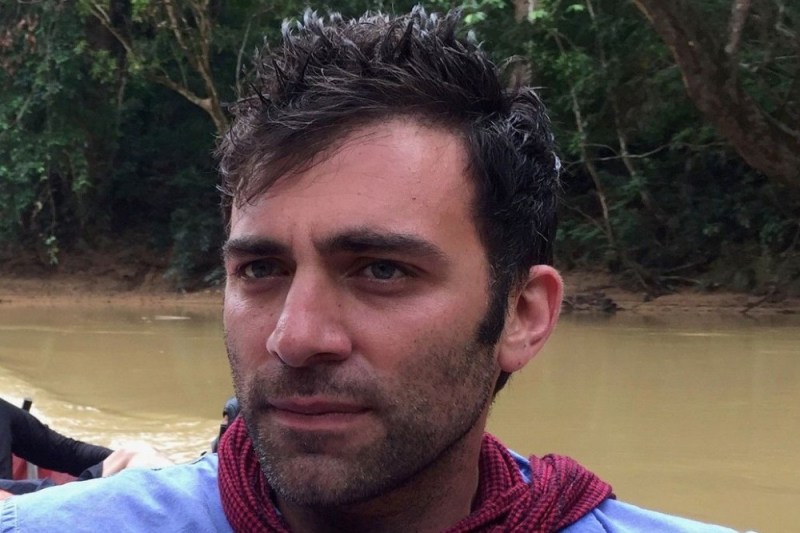
Roadrunner Film
TM: How did you feel participating in the new Roadrunner film?
Well, I’d say it was very emotional participating in it. When I went for the interview, this is all before the pandemic. Morgan shot most of his interviews. You know what I mean? I hadn’t really been to a restaurant in a long time.
We filmed in a restaurant in Tribeca and it was closed. And I was so used to restaurants being so chaotic and full of life when we filmed there, that going to this very closed, quiet restaurant and knowing that we were there to talk about Tony, who was now gone. All that excitement to life and activity and colors and smells and feelings of travel and all that. It was gone now and replaced by this empty, sterile restaurant, was very emotional.
TM: Apart from the television series, Tony had given so much thought to writing and putting words together as a craft, even prior to Kitchen Confidential. How do you think that impacted his voice as an author as well as a personality?
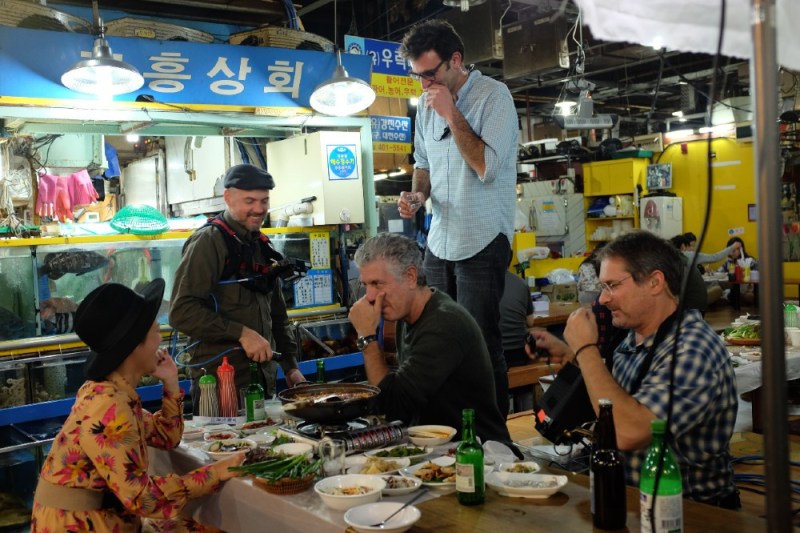
Well, Tony had this gift of speaking very similar to the way that he wrote. Which I think that a lot of the writing that ended up being his greatest writing was actually, a lot of it often was probably a first draft in the sense that it was like stream of consciousness. I mean, whatever it was in the way that he wrote, again, he could speak that way instantaneously in real time.
I mean, his problems though, were I guess more in his head about the stuff. Like, ‘Is it good? Is this derivative? Am I sounding like what I sounded like in the last book or the last thing that I wrote?’ I think those are where the pressures for him existed. Because he could just generate content I mean about nothing. And then at any time, just, he could turn the normal, every day into a fascinating re-interpretation of reality.
Do you think that’s one of the things that sets him apart from other travel hosts and celebrity chefs?
I would guess so, because I know I’ve never met anyone else with that gift. Certainly, in the quantity or quality that Tony possessed it. Haven’t really watched other travel shows and don’t really know that many other celebrity chefs, so perhaps not the best person to ask about that. But I do know that whatever he had was extremely unique.
On Tony’s Friendship and Impact
TM: Tell us a little bit about the impact Tony and working with him had on you.
I have no idea what my life would be like if I hadn’t got that first job with Tony. But then, I mean it changed my life in so many unbelievable ways. I certainly would have been a lot less worldly. Although I think it’s a bit natural for me, but certainly, I wouldn’t have developed such a violent distaste for convention, specifically in television.
When he was alive and we were making the shows, where’s the line between friendship or real life and work, or Tony and the show, or me and the show? It was always an almost non-existent, shadowy, ever-shifting line at best. And so now, I mean, I traveled with him extensively for 12 years and that was one hell of an education. They were just so brilliant and fascinating. And we were in the most amazing, unbelievable places and scenarios. I really credit much of who I am as an adult and a human being to him.


